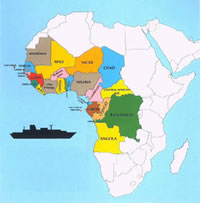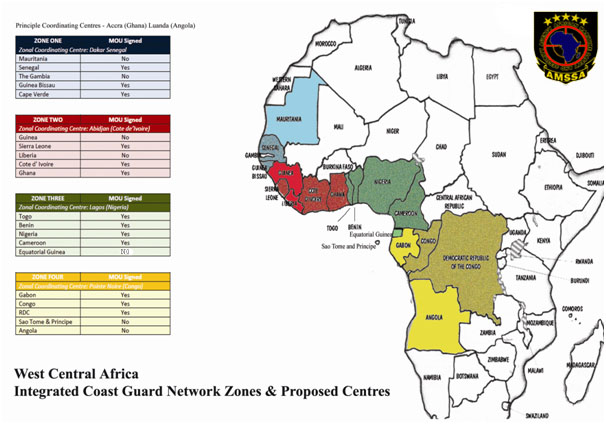

The MOWCA partners and especially AMSSA would like to send a great thanks to the long standing dynamic and honourable Secretary-General . .
Prof. Magnus Teye ADDICO Republic of Ghana
. . . for his incredible advances and dedicated service for the MOWCA member states and regions. Prof ADDICO who has now stepped down due to ill health will be greatly missed by all.
The new Secretary General is based in ANGOLA more information soon. .
MOWCA (2008) mission statement
Background: The Maritime Organisation for the West and Central Africa (MOWCA) was established in May 1975 (Charter of Abidjan) as the Ministerial Conference of West and Central African States on Maritime Transport (MINCONMAR). The name was changed to MOWCA as part of reforms adopted by the General Assembly of Ministers of Transport, at an extraordinary session of the Organisation held in Abidjan the Republic of Côte d'Ivoire from 4-6 August 1999.
jective of MOWCA is to serve the regional and international community for handling all maritime matters that are regional in character.
MOWCA unifies 25 countries on the West and Central African shipping range (inclusive of five landlocked countries). These countries comprise of 20 coastal states bordering the North and South Atlantic Ocean, and to explain the maritime link for landlocked countries the ports of the Ocean interfacing countries provide the seaborne trade of those that are landlocked.
What is of special interest for MOWCA is that together the countries within the remit of the organisation in 1998 generated an estimated 247million tonnes of cargo which represented 4.8% of world cargo, 95% of which was seaborne. MOWCA has also identified a number of problems at the sub regional level relating to the cost-effectiveness of shipping services these are; availability of shipping space, frequency of sailings, level of freight rates, competitiveness and survival of national/regional operators, efficiency of seaports, safety of cargo/ships, inland transportation networks, availability of coastal shipping services, efficiency of multi-modal transport systems and trade facilitation, protection of shippers interests, and the special case of landlocked countries.
The focus of MOWCA policy is on the following:
The overarching decision-making body for MOWCA is a General Assembly of Ministers of Transport of Member States meeting at ordinary sessions every two years and at extraordinary sessions if necessary.
The MOWCA Secretary-General coordinates the following three specialized Units for MOWCA these represent the ports, shippers and operators.
|
||
Coastal States: |
||
Angola |
The Gambia |
Nigeria |
Benin |
Ghana |
Sao Tome and Principe |
Cameroon |
Guinea |
Senegal |
Cape Verde |
Guinea-Bissau |
Sierra Leone |
Republic of Congo |
Equatorial Guinea |
Togo |
Democratic Republic of Congo |
Liberia |
|
Cote d'Ivoire |
Mauritania |
|
Gabon |
Mozambique |
|
Landlocked Countries: |
||
Burkina Faso |
Chad |
Niger |
Central African Republic |
Mali |
|
Source: MOWCA 2008 |
||
MOWCA LINKS |
|
Integrated Coast Guard Function Network |
|
| Policies and Reports | |
| News | |
| Conferences and Events | |

The importance of MOWCA for the sustainable development of the North Atlantic is evident. The expertise demonstrated by way of their policy underscores the significant benefits for member states. MOWCA acknowledges that African sub-region's coastal waters provide for some of the World’s busiest shipping routes; which in turn create for large volumes of tanker traffic inclusive of movements from African oil producing countries and maritime safety concerns are linked to maritime transport movements. More importantly MOWCA is already working towards problem solving with regards to issues associated with the implementation of various international conventions relating to safety (SOLAS), marine pollution (MARPOL) as well as the contemporary International Safety Management Code (ISM) and the Standard of Training Certification and Watch-keeping for Seafarers (STCW) Convention.